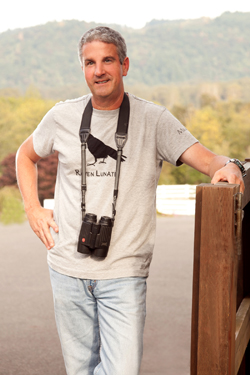Dedicated to the study of vertebrate ecology in the Pacific Northwest
Society for Northwestern
Vertebrate Biology

2015 Meeting Plenary – John Marzluff
 John Marzluff, Ph.D., is Professor of Wildlife Science at the University of Washington. His research has been the focus of articles in the New York Times, National Geographic, Audubon, Boys Life, The Seattle Times,and National Wildlife. PBS’s NATURE featured his raven research in its production,”Ravens,” and his crow research in the film documentary, “A Murder of Crows.”
John Marzluff, Ph.D., is Professor of Wildlife Science at the University of Washington. His research has been the focus of articles in the New York Times, National Geographic, Audubon, Boys Life, The Seattle Times,and National Wildlife. PBS’s NATURE featured his raven research in its production,”Ravens,” and his crow research in the film documentary, “A Murder of Crows.”
Extended Biography:
John Marzluff is James W. Ridgeway Professor of Wildlife Science at the University of Washington. His graduate (Northern Arizona University) and initial post-doctoral (University of Vermont) research focused on the social behavior and ecology of jays and ravens. He continues this theme investigating the intriguing behavior of crows, ravens, and jays. His current research brings this behavioral approach to pressing conservation issues including raptor management, management of pest species, and assessment of nest predation. He has led studies on the effects of military training on falcons and eagles in southwestern Idaho, the effects of timber harvest, recreation, and forest fragmentation on goshawks and marbled murrelets in western Washington and Oregon, conservation strategies for Pacific Island crows, and the effects of urbanization on songbirds in the Seattle area. His classes include Ornithology, Governance and Conservation of Rare Species, Field Research in Yellowstone, and Natural and Cultural History of Costa Rica.
Professor Marzluff has written five books and edited several others. His graduate research in communication, social organization, demography, and foraging behavior was reveled in The Pinyon Jay, 1992, Academic Press (coauthored with his advisor Russell Balda). His book, In the Company of Crows and Ravens (with Tony Angell, 2005 Yale U. Press) blends biology, conservation, and anthropology to suggest that human and crow cultures have co-evolved. This book won the 2006 Washington State Book Award for general nonfiction. With his wife, Colleen, he published Dog Days, Raven Nights (2011 Yale University Press), which combines reflection with biology and the recreational pursuit of dog sledding to show how a life in science blooms. Gifts of the Crow (2012 Free Press, coauthored with Tony Angell) applies a neurobiological perspective to understand the amazing feats of corvids. His most recent book Welcome to Subirdia (2014 Yale) discovers that moderately settled lands host a splendid array of biological diversity and suggests ways in which people can steward these riches to benefit birds and themselves.
Dr. Marzluff has mentored over 30 graduate students and authored over 135 scientific papers on various aspects of bird behavior and wildlife management. He is a member of the board of editors for Ecological Applications. He has edited Avian Conservation: Research and Management that includes 40 chapters detailing research approaches to conserve avian biodiversity throughout the world (1998, Island Press), Avian Conservation and Ecology in an Urbanizing World (2001, Kluwer Academic Publishers), Radiotelemetry and Animal Populations (2001, Academic Press),Urban Ecology: An International Perspective on the Interaction Between Humans and Nature (2008, Springer), and Perspectives in Urban Ecology (2011, Springer). He is currently leader of the U.S. Fish and Wildlife Service’s Recovery Team for the critically endangered Mariana Crow, a former member of the Washington Biodiversity Council, and a Fellow of the American Ornithologist’s Union.


